“一般过去时”
一般过去时

三.一般过去时(simple past tense)1.概念一般过去时表示过去某一时刻,某一段时间发生的动作或存在的状态。
一般过去时用动词的过去式表示。
2.构成一般过去时用动词的过去式表示。
be的过去式有was,were两种; have 的过去式是had;规则动词的过去式在动词词尾加-ed,具体构成规则如下:1)一般情况,动词后加ed,例词work-worked,clean-cleaned,play-played,wash-washed2)以不发音的e结尾,-d,例词live-lived,move-moved,hope-hoped,arrive-arrived 3)以辅音字母+y结尾,变y为 i再加-ed,例词study-studied,carry-carried,cry-cried,identify-identified 4)以辅音字母结尾的重读闭音节,双写最后一个辅音字母加-ed,例词plan-plannedstop-stopped,beg-begged,grab-grabbed 3.用法 (1) 表示发生在过去的动作或存在的状态。
如:He went shopping with his friends last week.They arrived ten minutes ago.He became a hotel manager ten years ago.Did you go to the concert last night?(2) 表示在过去经常发生的动作或习惯动作。
如:He visited his grandparents once a month last year.She usually went to work by car last year.When I was at school, I always went to school by bus.4.如何识别一般过去时常见的标志词有:1). yesterday, the day before yesterday.2). last week / year / month / term …(简称last系列)3). two hours ago, three years ago, a moment ago…(简称ago系列)4). in / on + 过去的年/月/日,如 in 1999, on April, 20055). just now, once upon a time, one day…5.易错点例析:(1)——Your phone number again? I _________ quite catch it.——It’s 4331577A. didn’tB. couldn’tC. don’tD. can’t(2)——Mr. Smith isn’t coming tonight.——But he _________.A. promisesB. promisedC. will promiseD. had promised(3) ——Hey, look where you are going!——Oh, I’m terribly sorry. _________.A. I’m not noticingB. I wasn’t noticingC. I haven’t noticedD. I don’t notice(4) ——Oh it’s you ! I _________ you.——I’ve had my hai r cut.A. didn’t realizeB. haven’t realizedC. didn’t recognizeD. don’t recognized(5) ——Since you’ve agreed to go, why aren’t you getting ready?——But I _________ that you would have me start at once.A. don’t realizeB. didn’t realizeC. hadn’t realizedD. haven’t realized(6) ——It’s twelve o’clock, I think I must be off now.——Oh, really? I _________ it at all.A. don’t realizeB. haven’t realizedC. didn’t realizeD. hadn’t realizedKey:ABBCBC6.中考真题及模拟(2009朝阳区一模)He went into his room, _______ the light and began to work.A. has turned onB. will turn onC. turns onD. turned on(2009海淀一模)——What’s the best food have you had in Beijing, Alex?——Roast duck! I _________to a famous restaurant to have it last week.A. have goneB. goC. will goD. went(2009宣武区一模)——Do you know how many gold medals the 23-year-old Michael Phelps _____________at the 2008 Summer Olympic Games?——Eight.A. winB. winsC. wonD. has won(2008北京)We were in Qingdao last week and __________ great fun there.A. will haveB. have hadC. hadD. have(2007北京)——What did you do after school yesterday?——I _________basketball with my friends.A. playB. playedC. will playD. am playing(2005北京)---Hi, Kate. You look tired. What’s the matter?---I ______well last night.A. didn’t sleepB. don’t sleepC. haven’t sleptD. won’t sleep (2008四川泸州)Yesterday,Tony’s family _________ a good time.A. hasB. haveC. had(2007湖南湘潭)I’m sorry you’ve missed the train. It _______10 minutes ago.A. leftB. has leftC. had left(2007福州)——Mr Green, __________you________ Three Lanes and Alleys(三坊七巷)last Sunday?——No, but I’ll visit them next week.A. will; go toB. have; been toC. did; go toD. have; gone to (2007浙江)——What did the teacher say just now?——He __________us not to play computer games all day.A. tellsB. toldC. has toldD. is told(2007江西)——Inventors have changed the way we live.——So they are famous for the great things they _________.A. doB. didC. are doingD. had done(06江西)——Where’s the cake I made this morning?——We _______ it, mum. Can you make another one for us?A. ateB. eatC. will itD. were eating。
一般过去时的用法和结构
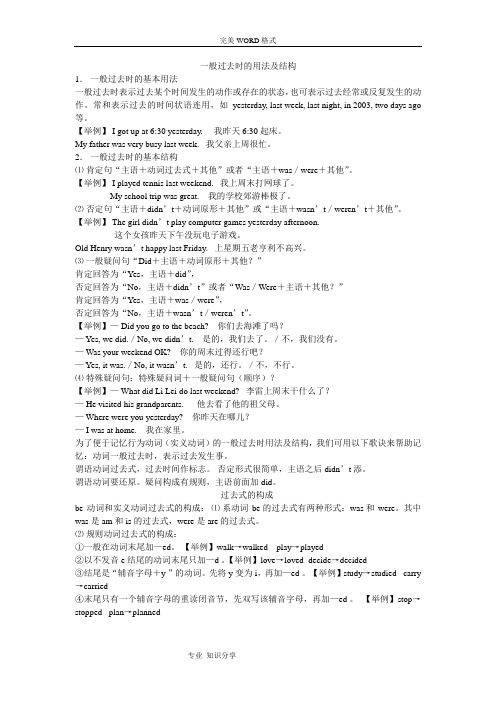
一般过去时的用法及结构1.一般过去时的基本用法一般过去时表示过去某个时间发生的动作或存在的状态,也可表示过去经常或反复发生的动作。
常和表示过去的时间状语连用,如yesterday, last week, last night, in 2003, two days ago 等。
【举例】 I got up at 6:30 yesterday. 我昨天6:30起床。
My father was very busy last week. 我父亲上周很忙。
2.一般过去时的基本结构⑴肯定句“主语+动词过去式+其他”或者“主语+was/were+其他”。
【举例】 I played tennis last weekend. 我上周末打网球了。
My school trip was great. 我的学校郊游棒极了。
⑵否定句“主语+didn’t+动词原形+其他”或“主语+wasn’t/weren’t+其他”。
【举例】 The girl didn’t play computer games yesterday afternoon.这个女孩昨天下午没玩电子游戏。
Old Henry wasn’t happy last Friday. 上星期五老亨利不高兴。
⑶一般疑问句“Did+主语+动词原形+其他?”肯定回答为“Yes,主语+did”,否定回答为“No,主语+didn’t”或者“Was/Were+主语+其他?”肯定回答为“Yes,主语+was/were”,否定回答为“No,主语+wasn’t/weren’t”。
【举例】— Did you go to the beach? 你们去海滩了吗?— Yes, we did./No, we didn’t. 是的,我们去了。
/不,我们没有。
— Was your weekend OK? 你的周末过得还行吧?— Yes, it was./No, it wasn’t. 是的,还行。
/不,不行。
一般过去时的定义以及用法概念
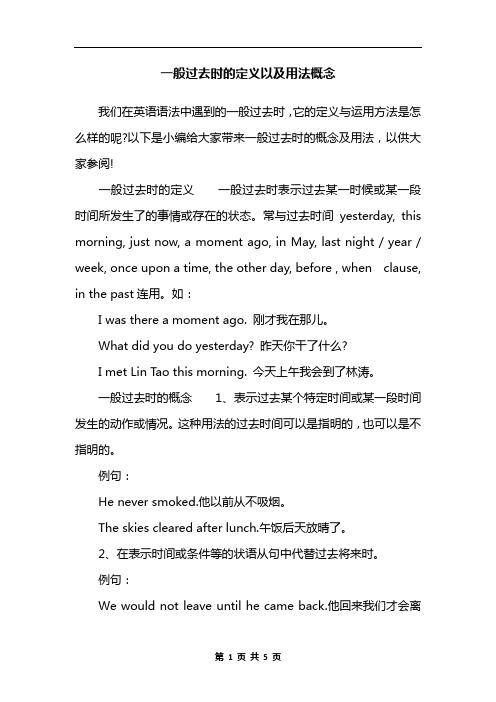
一般过去时的定义以及用法概念我们在英语语法中遇到的一般过去时,它的定义与运用方法是怎么样的呢?以下是小编给大家带来一般过去时的概念及用法,以供大家参阅!一般过去时的定义一般过去时表示过去某一时候或某一段时间所发生了的事情或存在的状态。
常与过去时间yesterday, this morning, just now, a moment ago, in May, last night / year / week, once upon a time, the other day, before , when clause, in the past连用。
如:I was there a moment ago. 刚才我在那儿。
What did you do yesterday? 昨天你干了什么?I met Lin Tao this morning. 今天上午我会到了林涛。
一般过去时的概念1、表示过去某个特定时间或某一段时间发生的动作或情况。
这种用法的过去时间可以是指明的,也可以是不指明的。
例句:He never smoked.他以前从不吸烟。
The skies cleared after lunch.午饭后天放晴了。
2、在表示时间或条件等的状语从句中代替过去将来时。
例句:We would not leave until he came back.他回来我们才会离开。
I didnt go to the party that evening as I started the next day.那天晚上我没有去参加聚会,因为我第二天就要出发。
3、表示现在时间。
这种用法使句子在语气上较为婉转客气,能这样用的动词为数不多,如:hope,wish,want,wonder,think,intend 等。
例句:I hoped you would come and have dinner with us.我希望你能来和我们一起吃饭。
一般过去时
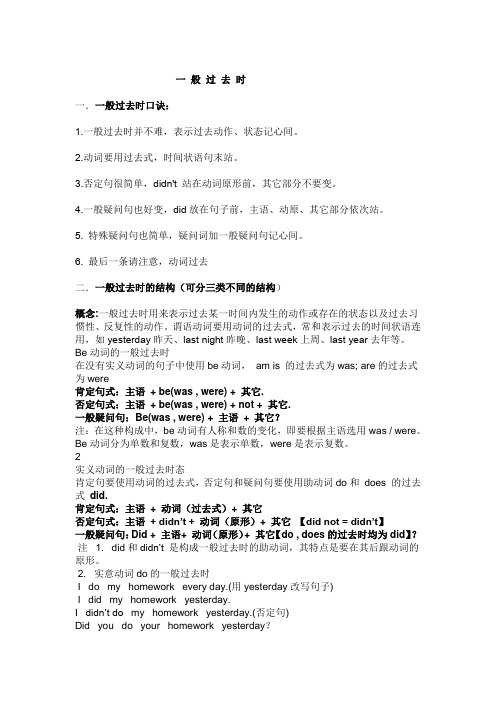
一般过去时一.一般过去时口诀:1.一般过去时并不难,表示过去动作、状态记心间。
2.动词要用过去式,时间状语句末站。
3.否定句很简单,didn't 站在动词原形前,其它部分不要变。
4.一般疑问句也好变,did放在句子前,主语、动原、其它部分依次站。
5. 特殊疑问句也简单,疑问词加一般疑问句记心间。
6. 最后一条请注意,动词过去二.一般过去时的结构(可分三类不同的结构)概念:一般过去时用来表示过去某一时间内发生的动作或存在的状态以及过去习惯性、反复性的动作。
谓语动词要用动词的过去式,常和表示过去的时间状语连用,如yesterday昨天、last night昨晚、last week上周、last year去年等。
Be动词的一般过去时在没有实义动词的句子中使用be动词,am is 的过去式为was; are的过去式为were肯定句式:主语+ be(was , were) + 其它.否定句式:主语+ be(was , were) + not + 其它.一般疑问句:Be(was , were) + 主语+ 其它?注:在这种构成中,be动词有人称和数的变化,即要根据主语选用was / were。
Be动词分为单数和复数,was是表示单数,were是表示复数。
2实义动词的一般过去时态肯定句要使用动词的过去式,否定句和疑问句要使用助动词do和does 的过去式did.肯定句式:主语+ 动词(过去式)+ 其它否定句式:主语+ didn’t + 动词(原形)+ 其它【did not = didn’t】一般疑问句:Did + 主语+ 动词(原形)+ 其它【do , does的过去时均为did】?注 1. did和didn’t 是构成一般过去时的助动词,其特点是要在其后跟动词的原形。
2. 实意动词do的一般过去时I do my homework every day.(用yesterday改写句子)I did my homework yesterday.I didn’t do my homework yesterday.(否定句)Did you do your homework yesterday?Yes ,I did. /No, I didn’t.(一般疑问句)3情态动词的一般过去时态情态动词的过去式:can→could , may→might , must→must ,will-would,should-should。
一般过去时详解

基本概念一般过去时(simple past tense)表示过去某个时间里发生的动作或存在的状态,常和表示过去的时间状语连用,如:yesterday,last night,in 1990,two days ago 等。
一般过去时也表示过去经常或反复发生的动作,常和often,always等表式频率的时间状语连用。
过去习惯性、经常性的动作、行为;过去主语所具备的能力和性格。
时间状语Ago(two hours ago(一段时间+ago),yesterday(句子开头或结尾),the day before yesterday,last week,last(year,night,month…),具体时间(如Jan.fourth),just now,at the age of,one day,long ago,once upon a time,and so on,this morning.long long ago(很久以前)。
1.直接加ed:work—— worked look——looked play——played,2.以不发音e结尾的单词,直接加d:live ——lived hope——hoped use——used,3 以辅音字母+y结尾的,变y为i加ed:study—— studied carry——carried worry——worried,4以元音字母+y结尾的,直接加ed:enjoy ——enjoyed play——played5 以重读闭音节结尾的,双写最后的辅音字母+ed:stop——stopped plan——planned不规则变化的动词过去式:have---had are---were get---got say---said feel---felt do/does---didis---was基本结构主语+动词过去式+其他否定形式:①was/were+not;②在行为动词前加didn't,同时还原行为动词一般疑问句①Did+主语+do+其他?②Was\Were+主语+ do sth例句:She often came to help us in those days.I didn't know you are so busy.特殊疑问句疑问词+did+主语+动词原形+其他一般过去式的构成形式肯定式疑问式否定式疑问否定式I worked Did I work?I did not work Did I not work?He(she,it) worked Did he(she,it) work? He (she,it)did not work Did he(she,it)not work? We worked Did we work? We did not work Did we not work?You worked Did you work? You did not work Did you not work? They worked Did they work? They did not work Did they not work?用法(1)一般过去时表示在过去某个特定时间发生,也可以表示过去习惯性、经常性的动作。
一般过去时的变化规则
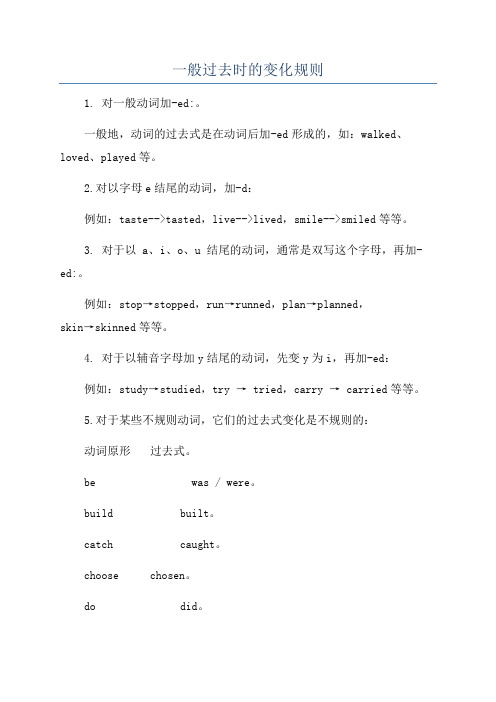
一般过去时的变化规则1. 对一般动词加-ed:。
一般地,动词的过去式是在动词后加-ed形成的,如:walked、loved、played等。
2.对以字母e结尾的动词,加-d:例如:taste-->tasted,live-->lived,smile-->smiled等等。
3. 对于以 a、i、o、u 结尾的动词,通常是双写这个字母,再加-ed:。
例如:stop→stopped,run→runned,plan→planned,skin→skinned等等。
4. 对于以辅音字母加y结尾的动词,先变y为i,再加-ed:例如:study→studied,try → tried,carry → carried等等。
5.对于某些不规则动词,它们的过去式变化是不规则的:动词原形过去式。
be was / were。
build built。
catch caught。
choose chosen。
do did。
fall fell。
fight fought。
find found。
fly flew。
forget forgot。
get got 。
give gave。
go went。
have had。
hear heard。
know knew。
leave left。
make made。
meet met。
pay paid。
ride rode。
see saw。
say said。
send sent。
show showed。
speak spoke。
spend spent。
stand stood。
take took。
tell told。
think thought。
understand understood。
wear wore。
win won。
6.有些动词的过去式和原形相同:例如:put,cut,hit,cost,let等等。
以上是一般过去时的变化规则。
1、用于过去时的动作或状态:She walked to the store. 她走到商店了。
一般过去时 时间状语

一般过去时的时间状语简介一、一般过去时的概念一般过去时表示过去某个时间发生的动作或存在的状态,通常表示过去的事实或经历,不涉及现在的情况。
例如:He lived in Beijing for ten years. 他在北京住了十年。
She bought a new dress yesterday. 她昨天买了一件新裙子。
一般过去时也可以表示过去经常反复发生的动作,常和often, always, sometimes等频率副词连用。
例如:He often played football with his friends when he was young. 他年轻时经常和朋友们踢足球。
二、一般过去时的构成一般过去时的肯定句和否定句的构成方法是在动词原形后加-ed或不规则变化,否定句在动词前加did not。
例如:动词原形过去式肯定句否定句work worked I worked hard.I did not work hard.study studied He studied English.He did not study English.go went She went to the park.She did not go to the park.see saw They saw a movie.They did not see a movie.一般过去时的一般疑问句和特殊疑问句的构成方法是在句首加did或疑问词+did,动词用原形。
例如:动词原形过去式一般疑问句特殊疑问句work worked Did you work hard?What did you work on?study studied Did he study English?How did he study English?go went Did she go to the park?Where did she go?see saw Did they see a movie?What movie did they see?三、一般过去时的用法一般过去时常和表示过去的时间状语连用,如yesterday, last week, ago等。
一般过去时总结
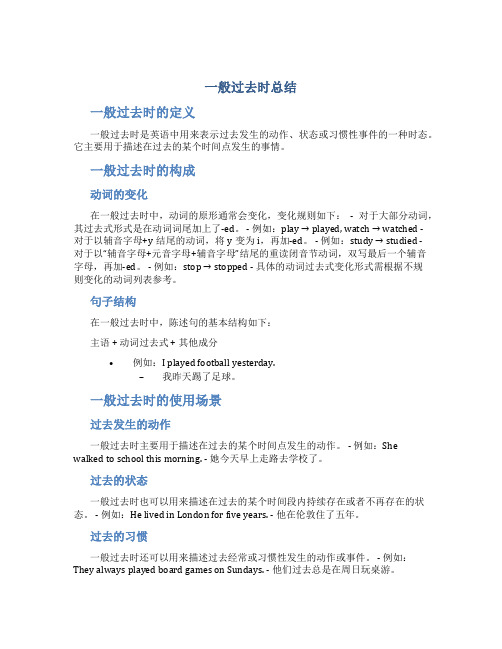
一般过去时总结一般过去时的定义一般过去时是英语中用来表示过去发生的动作、状态或习惯性事件的一种时态。
它主要用于描述在过去的某个时间点发生的事情。
一般过去时的构成动词的变化在一般过去时中,动词的原形通常会变化,变化规则如下:- 对于大部分动词,其过去式形式是在动词词尾加上了-ed。
- 例如:play → played, watch → watched -对于以辅音字母+y结尾的动词,将y变为i,再加-ed。
- 例如:study → studied -对于以“辅音字母+元音字母+辅音字母”结尾的重读闭音节动词,双写最后一个辅音字母,再加-ed。
- 例如:stop → stopped - 具体的动词过去式变化形式需根据不规则变化的动词列表参考。
句子结构在一般过去时中,陈述句的基本结构如下:主语 + 动词过去式 + 其他成分•例如:I played football yesterday.–我昨天踢了足球。
一般过去时的使用场景过去发生的动作一般过去时主要用于描述在过去的某个时间点发生的动作。
- 例如:She walked to school this morning. - 她今天早上走路去学校了。
过去的状态一般过去时也可以用来描述在过去的某个时间段内持续存在或者不再存在的状态。
- 例如:He lived in London for five years. - 他在伦敦住了五年。
过去的习惯一般过去时还可以用来描述过去经常或习惯性发生的动作或事件。
- 例如:They always played board games on Sundays. - 他们过去总是在周日玩桌游。
一般过去时和现在完成时的区别在描述过去发生的事情时,一般过去时和现在完成时有着一些区别。
一般过去时强调动作或事件在过去的某个时间发生,并且与现在没有直接的联系;而现在完成时则强调与现在的相关性。
一般过去时•用于过去某个时间发生的动作或事件上,强调过去的内容。
- 1、下载文档前请自行甄别文档内容的完整性,平台不提供额外的编辑、内容补充、找答案等附加服务。
- 2、"仅部分预览"的文档,不可在线预览部分如存在完整性等问题,可反馈申请退款(可完整预览的文档不适用该条件!)。
- 3、如文档侵犯您的权益,请联系客服反馈,我们会尽快为您处理(人工客服工作时间:9:00-18:30)。
规则动词的过去式
3 一个辅音字母结尾,重读闭音节先双
写这个辅音字母,然后加-ed。
stop→stopped drop--dropped plan→planned beg--begged
4“辅音字母+y”尾,y改为i, 再加 ed
carry--carried
study--studied
不规则动词的过去式
week ago.
2、含行为动词的一般过去时
3)疑问句及其回答: Did + 主语 +行为动词原形+其他? Yes, 主语+ did./No, 主语+didn’t. Did you spend weekend with me last time? Yes, I did./No, I didn’t. Did they go to Xi’an a week ago? Yes, they did./No, they didn’t.
四、一般过去时用法
1.在过去某一时间内发生的动作: He got to school at ten o’clock last Friday. 2.表示过去经常或反复发生的动作,常 与often,always等表示频度的 间状语连用: I often got up very early at that time.
II.句型转换 They came to China in 1990.(变一般疑 问句) come Did __________ they ________ to China in 1990? 2.I was ill for two days last week? (同上) Were you ill for two days last week? ________ 3. The twins went to school on foot every day. (同上) go _________ the twins _______ to school on Did foot every day? 4.She washed the clothes last Sunday. ( 变否定句) didn’t ________ She _________ wash the clothes last Sunday
ago
Time Mosterday 连用:
morning yesterday afternoon evening
the day before yesterday
4.其他时间状语:
just now in the old days in those days in 1980 the other day at that time once upon a time
1、含动词be的一般过去时
3)疑问句及其回答:
Was/Were+主语+其他成分? Yes,主语+was/were.(肯定回答) No,主语+wasn’t/weren’t.(否定回答)
Was
I at home last night? Yes,I was./No,I wasn’t. Were you in Class 1 last year? Yes,I was./No,I wasn’t. Were they early this afternoon? Yes,they were./No,they weren’t.
二、一般过去时的构成
含行为动词的一般过去时 含动词be的一般过去时 There
be句型的一般过去时
1、含动词be的一般过去时
am/is---was are---were 1)肯定句:主语+was/were+其他成分
例:I was at home last night. You were in Class 1 last year. They were early this afternoon.
也表示过去经常或反复发生 的动作,常和表示频度的时间 状语连用。 频度副词:often,always 等 例句: He always went to work by bus last year.
用于一般过去时的时间状语
1.与ago 连用: a moment two minutes five days four years 2.与last 连用
Discussion
•What about your past life?
2)否定句:
There+was/were+not+其他成分. There was not a bird in the room just now. There were not many boys in our class last term.
3、There be句型的一般过去时
3)疑问句及其回答:
四、一般过去时用法
3.表示已故人所做的事情。 Comrade Lei Feng did good deeds in his life. 雷锋同志做了一生的好事。
四、一般过去时用法
4. 表示过去所发生的一系列的动 作,而这一系列的动作是从现在 的角度来考虑的,不是从动作相 互之间的关系这一角度来考虑的。 Miss Liu got up at seven o’clock this morning, dressed, had breakfast, and went to work.
一般过去时
(Simple Past Tense)
目录
时态介绍 一般过去时的构成 动词过去式的构成
一般过去时用法
练习
一、时态介绍 定义: 一般过去时态表示过 去某个时间发生的动作或存 在的状态。常和表示过去的 时间状语连用
时间状语: yesterday last night in 1990 two days ago 等 例如: 1.I got up at 7:00 yesterday. 2.My father was at work yesterday afternoon.
1、含动词be的一般过去时
2)否定句:was not=wasn’t were not=weren’t I was not at home last night. You were not in Class 1 last year. They were not early this afternoon.
3、There be句型的一般过去时 1)肯定句:
There+was/were+其他成分. There was a bird in the room just now. There were many boys in our class last term.
3、There be句型的一般过去时
Was/Were+there+其他成分? Yes,there+was/were. No,there+wasn’t/weren’t. Was there a bird in the room just now? Yes,there was./No,there wasn’t Were there many boys in our class last term? Yes,there were./No,there weren’t
四、一般过去时用法
5、一些句子虽没有明确的时间状 语,但表示的意思是过去发生的 动作,且与现在毫无牵连,也会 用一般过去时 如: What did you say? What did you think of the film?
五、 练 习
I 用括号里动词的适当形式填空
1. Theydidn’t _____________ watch (not watch) TV just now. 2. They carried _______ (carry) water for Grandpa Liu made three days ago. 3. Mike and Jack _________ (make) the model have plane last month. 4. _______ (have) a good Did your friends ________ went time in the park that day? 5. My father _____ (go) to Beijing a week ago. 6. _____ Di Mary ______ study (study) at the No. 1 Middle School d the year before last? 7. His parents _________ didn’t go (not go) out for a walk after supper yesterday. 8. Where _______ was (be) Mei Fang last night?
三、动词过去式的构成
规则动词的过去式 不规则动词的过去式
规则动词的过去式
1、一般词尾加-ed。 play→played work -- worked ask -- asked clean→cleaned 2、e结尾的只加-d。 live→lived decide -- decided dance -- danced live→lived
2、含行为动词的一般过去时
1)肯定句:
主语+行为动词过去式+其他成分。
I
had some rice for lunch. You spent weekend with me last
time.
They
went to Xi’an a week ago.
2、含行为动词的一般过去时
2)否定句: did not=didn’t 主语+didn’t+ 行为动词原形+其他。 I didn’t have a bowl of rice for lunch. You didn’t spend weekend with me last time. They didn’t go to Xi’an a
